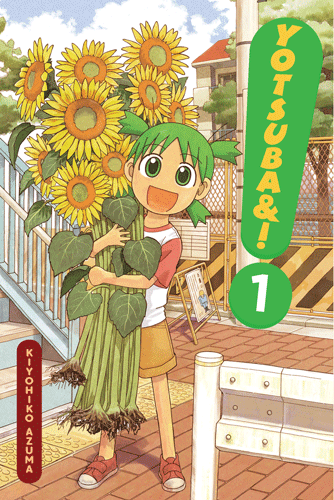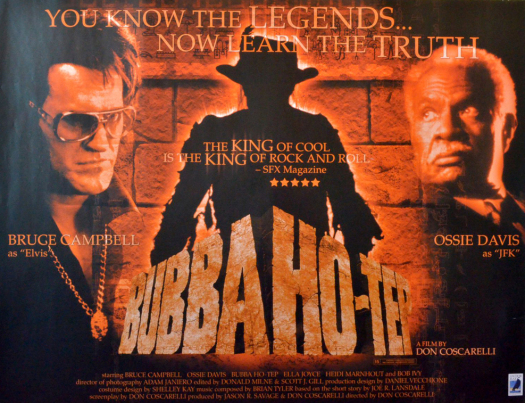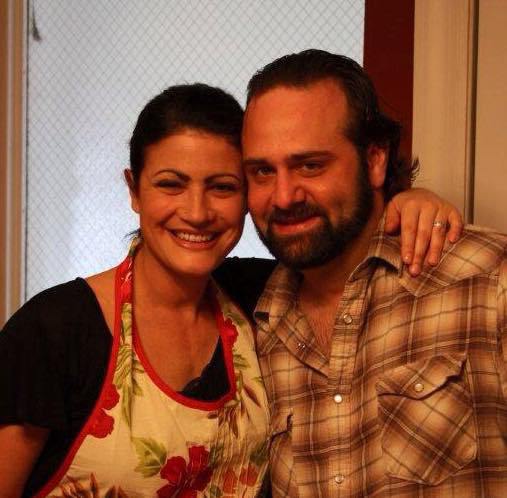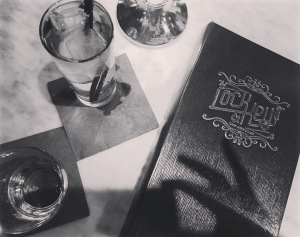
I know what you’re thinking. You’re thinking: “Lyda, where is the porn? We depend on you for all the yaoi porn. Why are you reading this sappy drivel???!!”
I don’t know. My only excuse is that I’ve READ all the yaoi my library has and I had another very sloooooow shift at Maplewood when I picked up Yotsuba&! / Yotsuba to!.
When I hunted around on the shelves, I saw a bunch of other things that I could read–like Hellsing, should I read Hellsing? But, for whatever reason (*cough*Trump*cough*), I have lately gravitated towards simple, sappy, slice-of-life stories about absolutely NOTHING.
Because I’ve read a bunch in a row, I’ve been thinking about slice-of-life for awhile now.
I know why it appeals to me, as a Western reader. For me, obviously, so much of daily life in Japan is mysterious, foreign. Just going to the grocery store is kind of an adventure. I’m not at all familiar with how grocery stores in Japan are laid out, what you can find there, etc., etc. Because it’s all new to me, all the mundane things have a subtle sort of inherent drama, like the kind of excitement that travel to another country brings.
What do you suppose the appeal is in Japan?
I’ve been wondering how these would read if they were American. Like, is part of the appeal the ‘wholesomeness’ of these adventures?
Yotsuba is an odd, enthusiastic five year old girl, who is terrible at drawing and invites herself over to her neighbor’s apartment. The family in Yotsuba&! do the sorts of things you see a lot of in anime and manga, particularly in these kind of slower paced, slice-of-life oriented stories, like a cicada hunt on the wooded grounds of a local shrine. Bug hunting is a thing, apparently. But, summer bug hunting seems to be somewhat more associated with “life in the country.” So, then, what would that even be in an American story? What’s the analog? Going fishing at a creek?
When I think about it that way, it all suddenly seems so very… Mayberry.
Which makes me wonder, are there essential Japanese values that are being promoted in these manga? Especially since there is a tendency in these stories that involve young kids, to have little life lessons about being polite, expected behavior, etc.
…
….
WTF. Am I reading Japanese propaganda?
SPOILERS
.
.
.
Despite the sinister specter cast by the fact that I might be captivated by what is probably some kind of “conservative/traditional blueprint for the perfect Japanese lifestyle as determined by The Powers That Be/magazine publishers,” I enjoyed Yotsuba&! / Yotsuba to!.
I mean, maybe I’m overthinking this. Maybe the appeal to the Japanese audience is similar to the stories we have here in America about the young professional who goes to live in New York. That’s very much an equivalent, I think. There are life lessons learned along the way… I mean, outside of the fact that maybe part of why this feels a tiny bit more like propaganda is that Yotsuba is shounen.
That’s right, this story about a young five year old girl was marketed to the same boys who read Bleach and Naruto….
Mmmm, back to my propaganda theory then.
ANYWAY. Even though I picked up the first two volumes on a lark, I went ahead and requested volume 3 because there is a tiny bit of a mystery going on about who Yotsuba is.
Normally, in manga, because of the way they’re drawn, you can’t easily tell the “foreigners” from the natives until someone tells you. There’s at least one scene, early on, in the first tankōbon, in which one of Yotsuba’s new neighbors see her in the playground, seemingly baffled by how swings work. The neighbor thinks, “Is she just weird or is she foreign?”
A lot is made of Yotsuba’s “weirdness,” even her own father describes Yotsuba as weird when asked for a description of her when she goes missing.
This, by the way, is a very curious moment, since, despite the fact that they are clearly in an urban space, dad is super not worried that she, a five year-old, has wandered off, and keeps insisting to the worried adults around him that “she’ll turn back up. She always does.” This, and the later cicada hunt, made me think that Yotsuba and her family are from the country. Especially since the urban adults were all ??? about her being missing and a lot more worried about it, and no one in the urban group had ever been bug hunting before.
So, I started to think that Yotsuba was just “not from around here” which is a different kind of foreign.
Until.
Until we find out that Yotsuba is an orphan. Not just a girl being raised by a widower, but an ORPHAN. Dad adopted Yotsuba… wait for it…. “on his travels.” Dad is a translator for a living, so apparently this job takes him to the places where this other language (it’s sort of presumed by everyone around him, though it’s not explicitly stated, to be English) is spoken.
In an omake that is entirely from the point of view of the neighbors (a household of all women, which contrasts Yotsuba’s family which seems to be made of her father and his… best friend?… Jumbo, who is JUMBO, as in super tall), we hear them speculate that maybe Yotsuba was adopted in Hawaii, since all she has revealed about where they lived previously was ‘far away, very, very far….’ and ‘left’ (as in the direction).
It’s kind of amazing to imagine a single, young Japanese man just randomly picking up an American orphan and taking her home. I mean, maybe this happens? A quick Google search tells me that this does happen IRL, though most of the adoptees are black.
So, I’m kind of intrigued. I doubt it’s going to be revealed that Yotsuba’s dad is a kidnapper, but I’m curious about how the story of Yotsuba’s adoption is going to be played out. There’s always this assumption that slice-of-life stories attempt to be as realistic as possible (I mean, there are supranational slice-of-life, so…), but there’s often this blindspot when it comes to Western culture/practices. If she is American, I’m curious if that’s also why Yotsuba, at five, seems to have a lot more trouble pronouncing things and seems to know fewer words than, say, the young girl of approximately the same age in Sweetness & Lightning….
I might just keep reading this for the amusement of reading about how someone of my “ethnicity” is portrayed in a manga.
Porn soon, I promise.
Advertisements Share this:





